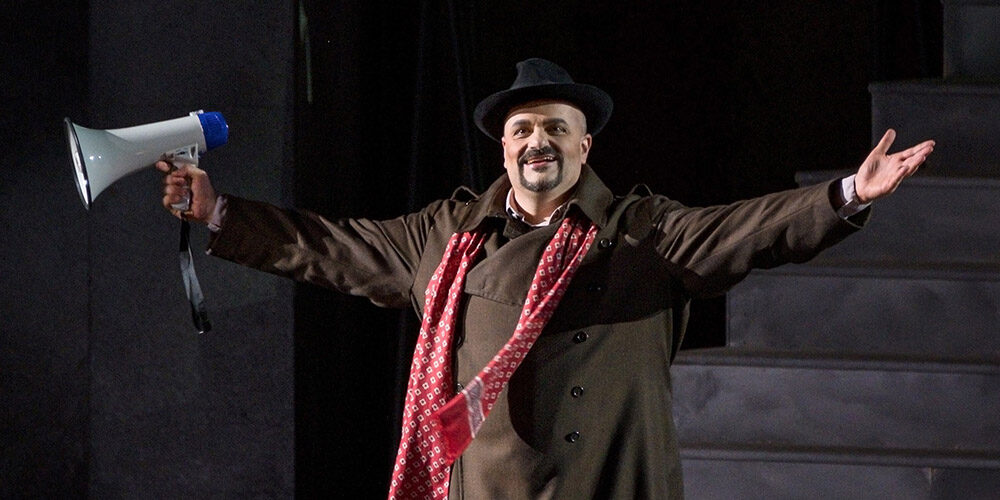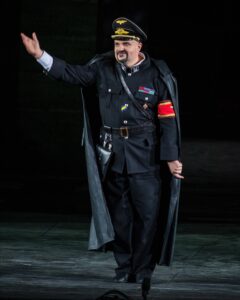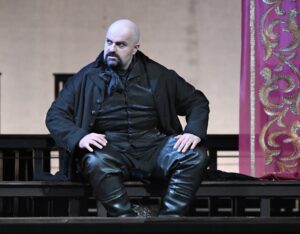Nature or nurture?
Sebastian Catana, BSE ’95, is one of those rare creatures equally adept at the arts and sciences.
Immersed in opera since conception, Sebastian was the only child of a pair of renowned performers in Romania. As his mother tells it, the mathematical genius was born to pursue music. It’s in his nature.
“When I was pregnant, I kept singing until my 28th week, so actually Sebastian was on stage with me,” says Emilia Catana. “In our house, all we listened to was opera.”
The boy saw his first opera performance when he was 4 years old. His mother was on stage.
“He was so impressed,” she says. “I think at that moment, in his mind, he wanted to be an opera singer.”
In 1990, the widowed Emilia looked to the U.S. after the fall of the Berlin Wall. She moved with her son to Dearborn, Mich., just as Romania’s iron-fisted dictator Nicolae Ceausescu lost power.
A gift for math
Catana spoke very little English when he enrolled at Dearborn High School (DHS). He often stood to reply when teachers addressed him, amusing his American classmates. Everything changed when a teacher, Gordon L. Bremenkampf, BS ’63/MA ’67, discovered his keen aptitude for math. It became their shared language.
“It didn’t take long for me to realize what a jewel he was,” Bremenkampf says. “He was undoubtedly the finest student I had encountered in my 39 years at DHS. He was brilliant, motivated, disciplined, and mature.”
Bremenkampf, who also taught at Henry Ford College (HFC), felt compelled to nurture Catana’s unlimited potential. He helped enroll the high school student in calculus courses at the college.
“I gained an ever-increasing appreciation for not only his academic prowess but his personal qualities,” says the mentor. “Sebastian was friendly, outgoing, and modest. I took him on several outings to Ann Arbor that summer, touring the campus, visiting the engineering facilities, and wandering through the bookstores. He belonged at U-M after completing high school; we both knew that.”
Getting into U-M

Gordon L. Bremenkampf, BS ’63/ MA ’67, (left) helped Catana enroll at U-M. (Image courtesy of Bremenkampf.)
One Saturday in 1991, Bremenkampf and Catana met with the international admissions and recruiting coordinator at U-M. Romanian authorities had refused repeated requests from DHS for Catana’s school records in retribution for the family fleeing the country. The admissions team assured him they would evaluate his academic performance at DHS, HFC, and on the SAT. Bremenkampf was confident Catana would be accepted.
“As an alum myself, one of my obvious motivations in taking Sebastian to the Office of Admissions was to recruit a gifted student and, therefore, enhance the University’s reputation for excellence,” he says.
Catana scored 780 (out of 800) on the math portion of the SAT. U-M admitted him under two conditions: He had to pass the TOEFL test of English proficiency, and the administration would monitor his academic performance throughout his freshman year.
“My education at U-M was an exciting, challenging, and transformative full four years of my life, during which I learned so much about the world and myself,” Catana says. “I remember a world-class faculty and student body, an amazing diversity of people and ideas on a beautiful and welcoming campus.”
He completed a five-year program at U-M in four, graduating magna cum laude with his bachelor’s degree in chemical engineering. He subsequently earned his master’s degree in chemical engineering from Carnegie Mellon University in Pittsburgh. Bremenkampf’s nurturing had worked.
A passion for opera
While pursuing his doctorate in chemical engineering at Carnegie Mellon, Catana met Claudia Pinza, founder of the Ezio Pinza Council for American Singers (EPCASO) in Pittsburgh. Named after Pinza’s late father, a prominent actor and opera singer, EPCASO sponsors opera training programs in Italy. Catana enrolled in Pinza’s voice performance class at nearby Duquesne University. Pinza was so impressed by the talented baritone that she invited him to tour and perform in Europe. In 1999, Catana earned his performer’s degree/artist diploma from Duquesne.
Suddenly the multi-talented artist was at a career crossroads. His doctorate was nearly complete. But the stage also beckoned. In the end, he made his professional opera debut in 2001, singing in Les Huguenots at New York City’s Carnegie Hall.
Catana performed several roles with the Baltimore Opera Company for the 2001-02 season and the Seattle Opera for the 2002-03 season. From there, he appeared in a special concert with the National Symphony Orchestra in Mexico.
The Met
In 2003, the artist made his debut at the New York Metropolitan Opera, better known as the Met, one of the most prestigious operatic venues in the world. He played the role of Schaunard in La Boheme.
“The Met was fantastic,” says Catana. “You work with the best singers, conductors, and directors – I can’t even begin to express it.”
His mother attended the debut, along with Bremenkampf, Pinza, and Dr. John L. Anderson, former dean of the Carnegie Mellon College of Engineering.
“One of my greatest joys was to see Sebastian sing the role of Schaunard in La Boheme,” says Bremenkampf, who was seated in the director’s box. “I can’t quite describe what it was like to see him come on stage [at the Met] and fill that 4,000-seat auditorium with his beautiful voice.”
The two remain close to this day.
“Gordon Bremenkampf has been my teacher, my friend, my mentor, my counselor – everything,” Catana says. “He is a fantastic man who has had a huge influence on my career. He helped me get into college. He believed in me, and it is truly a blessing to have him in my life.”
Putting in the work
Catana spent nearly five years at the Met. Some of his roles included Fiorello in Il Barbiere di Siviglia, Marullo in Rigoletto, Morales in Carmen, and Valentin in Faust. He has toured opera houses throughout Europe and Israel for the past decade and currently is playing Tonio in Pagliacci. The production, directed by Cristian Taraborrelli, is at the Teatro Carlo Felice di Genova in Genoa, Italy.
“Tonio is one of the greatest roles in baritone repertoire,” says Catana, who is performing the role for the first time. “It’s a difficult part to sing; it’s a difficult part to act. It takes a lot out of you. If you do it too early, you might harm your voice.”
No regrets
These days, Catana is based in Pittsburgh, living a life far different than a chemical engineer. He rehearses 6-8 hours daily, sometimes longer. He favors the operas by Giuseppe Verdi, including Aida, Otello, Falstaff, Rigoletto, Il Trovatore, and La Traviata. He has won awards and accolades from the Metropolitan Opera National Council Auditions, the Licia Albanese-Puccini Foundation Voice Competition, the Giulio Gari Foundation International Voice Competition, and the Loren L. Zachary Society National Vocal Competition.
“I always enjoyed the intellectual challenge of engineering and appreciate the education I received at U-M, but I’m much more passionate about what I do now,” says Catana.
At first, Bremenkampf was disappointed that Catana quit engineering, especially given his command of mathematics and physics.
“Yes, I initially thought he was making a mistake,” his mentor says now. “That was one of many examples in my life where I was wrong, as evidenced by his tremendous success on the stage.”
(Top image: Sebastian Catana as Tonio in Pagliacci. Image courtesy of Catana.)







Karen Reeds - MA 1970 botany
Does Mr. Catana know that another wonderful singer, Jerome Hines, faced a similar quandary? I recall that, when I was a kid, my father, R.L. Meier (U-M professor, Natural Resources, in 1950s/60s) told me about Hines who had been a fellow chemistry student at UCLA before World War II. I don’t remember that we had any recordings of Hines’s, but the story of Hines’s choice obviously made a big impression on me.
Reply
Susan Montgomery - 1984
I had the pleasure of being Sebastian’s academic advisor at UM, and what a pleasure that was, very polite and dedicated to his studies. I have been following his opera career for many years now, and it’s so exciting to see how far he has come. I’m delighted he’s pursuing a career he has a passion for. Thanks for filling in some of the blanks in his story, I had no idea about the family background. Go Sebastian!
Reply